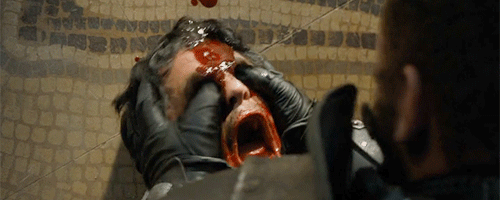George RR Martin Speaks About Rape Scenes And Violence Against Women In ‘Game Of Thrones’
“I want to portray struggle. Drama comes out of conflict. If you portray a utopia, then you probably wrote a pretty boring book.”

We’ve known since the beginning that we were in for a bumpy ride when it comes to Game of Thrones. Whether it be the brutal deaths of major and minor characters alike, wolficide, straight up torture, and backstabbing so overt that it is basically just stabbing, you rarely make it through an episode without gasping or covering your eyes.
Or doing both at once.

Sorry.
Laced throughout all this, there’s also been a thread of both physical and sexual violence against women, and after five seasons of this people are getting really fed up. More than any of the other horrific things that happen in the series, it is when rapes happen on the show that people decide to stop watching forever. And while George R.R. Martin — the man behind the books behind the series — generally shied from definitively weighing in on the debate, EW spoke to him in the wake of the latest rape scene to garner his thoughts.
As he has in previous interviews, Martin points to the historical context in which Game of Thrones is set. “The books reflect a patriarchal society based on the Middle Ages,” he says. “The Middle Ages were not a time of sexual egalitarianism.”
He also explains, “I wanted my books to be strongly grounded in history, and to show what medieval society was like, and I was also reacting to a lot of fantasy fiction. Most stories depict what I call the ‘Disneyland Middle Ages’—there are princes and princesses and knights in shining armor, but they didn’t want to show what those societies meant and how they functioned.”
On the topic of sexual violence specifically: “I’m writing about war, which what almost all epic fantasy is about. But if you’re going to write about war, and you just want to include all the cool battles and heroes killing a lot of orcs and things like that and you don’t portray [sexual violence], then there’s something fundamentally dishonest about that. Rape, unfortunately, is still a part of war today. It’s not a strong testament to the human race, but I don’t think we should pretend it doesn’t exist.”
He concludes by saying, “I want to portray struggle. Drama comes out of conflict. If you portray a utopia, then you probably wrote a pretty boring book.”
So, Let’s Unpack That A Little
It’s good to hear what the man who dreamed up the story’s take is, and he makes a lot of fair points. But the main criticism that’s been levelled at Game of Thrones isn’t that it portrays a patriarchal society; it’s that many of the assaults on women shown on screen are viewed as gratuitous. Or, as Sonia Saraiya writes in Salon,”The problem, as ever, with Game Of Thrones rape is not that it exists, but that it fails to adequately justify why it exists.”
Moreover, it’s not dishonest to omit these scenes — particularly at this point in the series. We viewers know that this is the reality of Westerosi society. We get it. It’s happening. We got it from episode one; we got it when they showed us Craster’s Keep; and we got it again when Jamie Lannister assaulted his sister Cersei over the recently dead body of their son. If we were getting fed rape scenes just to show the realities of war, where is the episode that is nothing but people doing armour maintenance and brushing down their horses? Viewers need to be given some credit for picking up implication.
It’s getting to the point where sexual assault on the show has become par for the course; expected — and among all other criticism, it is just plain bad storytelling. The writers have had five seasons to world build: as Osahon Okundaye argues in The Huffington Post, we don’t need to see it anymore. “Even if, for some reason, sexual violence is truly central to the “Thrones” universe, it doesn’t need to be shown as often or as intently as it is. At best, it obscures the plot and at worst, it makes a real evil look attractive.”
Martin is right; drama does come out of conflict — and he has written a series packed with the stuff. Persistent portrayals of sexual assault aren’t necessary for that.
–
Image via georgerrmartin.com